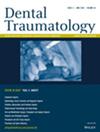Evaluation of Pediatric Oral Health-Related Quality of Life score in children with traumatic dental avulsion injury: A Questionnaire-Based Cross-Sectional survey
Abstract
Background/Aim
Dental avulsion injury, being one of the traumatic dental injuries, has negative impacts on children's life quality. This study aims to evaluate the Pediatric Oral Health-Related Quality of Life (POQL) scores of children with dental avulsion history from their perspective.
Materials and Methods
The population of this cross-sectional study comprises 40 patients, aged between 8 and 14, who have a history of dental avulsion, in comparison to 40 other healthy peers. A questionnaire including general questions (such as age, gender, loss of tooth due to dental avulsion, malocclusion) and POQL instrument, with subscales including physical function, social function, emotional function, and role function, were completed by these children. Mann–Whitney U-test is used when comparing the POQL scores.
Results
The social scores (median: 47, interquartile range [IQR]: 17–95) and total score percentages (median: 30, IQR: 14–40) of children with a history of avulsion were higher than those of their healthy peers (p < 0.05). The higher total POQL scores among girls (median: 37, IQR: 31–47) with a history of dental avulsion compared to boys (median: 19, IQR: 8–34) (p = .002) can be attributed to girls achieving higher scores in both social (median: 81, IQR: 39–100) and emotional (median: 35, IQR: 17–47) scores following dental avulsion (psocial = .02, pemotional = .006). Whether the avulsed tooth is replanted or not, it has not made any visible impact on the POQL scores. However, the loss of replanted teeth over time has created a borderline significant difference in emotional scores (median: 21, IQR: 11–35, p = .055).
Conclusion
Within the limits of our study, avulsion injuries have negative effects on children's emotional, social, and total quality of life. Even though avulsion injuries may be inevitable, to prevent these negative effects, it is vital to provide appropriate psychological support in the treatment of these children.

 求助内容:
求助内容: 应助结果提醒方式:
应助结果提醒方式:


